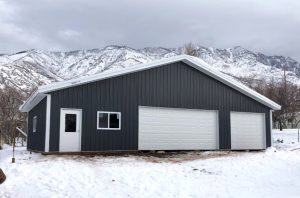Cool Metal Roofing for Post Frame Buildings
Energy efficiency has leaped to the forefront of concerns for owners of new post frame buildings. Using cool metal roofing for post frame buildings can assist new building owners in reaching their goals.
What is a Cool Roof?
A cool roof is one which strongly reflects sunlight and also cools itself by efficiently emitting radiation to its surroundings. The roof literally stays cooler and reduces the amount of heat conducted to the building below. If a building does not have air conditioning, this keeps the building cooler and a more constant temperature. If a building has air conditioning, the equipment does not have to work as hard.
Imagine wearing a white or a black T-shirt on a hot day. By wearing the white T-shirt you will remain cooler than if you wore a black T-shirt because it reflects more sunlight and absorbs less heat. Cool roofs, like a white T-shirt, keep the internal temperature of the building lower.
However, a cool roof need not be white. There are many “cool color” products which use darker-colored pigments which are highly reflective in the near infrared (non-visible) portion of the solar spectrum. Because a white roof strongly reflects both visible and near infrared sunlight, a white roof will typically be cooler than a cool colored roof.
The two basic characteristics which determine the “coolness” of a roof are solar reflectance (SR) and thermal emittance (TE). Both properties are rated on a scale from 0 to 1, where 1 is the most reflective or emissive.
What are the Benefits of a Cool Roof?
 A cool roof can significantly reduce your cooling energy costs and increase your comfort level by reducing temperature fluctuations inside your post frame building. Average energy savings range from 7%-15% of total cooling costs. Some other benefits include:
A cool roof can significantly reduce your cooling energy costs and increase your comfort level by reducing temperature fluctuations inside your post frame building. Average energy savings range from 7%-15% of total cooling costs. Some other benefits include:
-Reducing your utility bills associated with air conditioning
-Increasing occupant comfort and avoid installing an air conditioner where there isn’t already one
-Decreasing the size and prolong the life of your air conditioning system
-Lowering roof maintenance costs and extend roof life, avoiding reroofing costs and reducing solid waste
-Assist your post frame building in meeting building codes
-Mitigate your community’s Urban Heat Island Effect
-Maintain aesthetics with a roof which performs and looks good
-Receive utility rebates (in some locations)
What is the Right Roofing Material for Your Post Frame Building?
Below is a description of some things to consider in selecting a roofing product for your post frame building.
Slope
All roofs essentially fall into one of two general categories: low-slope (less than 2 inches of rise over 12 inches of run) and steep-slope (2:12 or greater).
Climate
In most climate zones worldwide, cool roofs can significantly reduce a building’s cooling load. However, cool roofs can also increase heating costs in winter months. This increase is usually greatly outweighed by the cooling energy savings achieved during summer months because the sun is low in the sky during winter months, the weather tends to be overcast, and snow often covers the roof, usually making the heat gain through the roof negligible in all but the most northern climate zones in the United States.
In selecting your roof, it is important to understand your climate zone and the actual energy your post frame building will save. There are two cool roof calculators available online which can give good estimates of how much energy you will save. You can find them at:
DOE Cool Roof Calculator
EPA Cool Roof Calculator
Cool Metal Roofing
The biggest advantage of cool metal roofing is the energy savings from reflecting and re-emitting heat away from your post frame building. If the heat doesn’t soak into the building, less air conditioning is required to keep it cool.
Since the heat is not slowly emitted into the air overnight, the surrounding community remains cooler as well, holding down energy costs and generation peaks at night. The heat island never forms.






